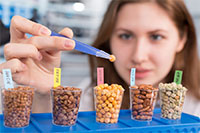Accreditation for Food Testing Laboratories
Large retailers, food organizations and regulatory agencies around the world look to food testing laboratories to ensure that the biological and chemical components of the food they process or package are safe for consumers. Using an accredited laboratory to assess this important safety information means government bodies and regulators will have confidence in the testing, measurement and calibration data generated. It’s an important consideration especially with the new Food Safety Moderizaton Act (FSMA) Rule for Foreign Supplier Verification Programs (FSVP) for Importers of Food for Humans and Animals, expected to roll out at the end of 2015.
 Food Testing Laboratories
Food Testing Laboratories
Food testing laboratories are required to meet the ISO/IEC 17025:2005 standard, which is the current international standard for determining the competency of testing laboratories. This is a generic standard and it’s used to accredit laboratories in many different fields, ranging from biological testing (food testing) to electrical testing (fibre optics) and other technical disciplines.
Best practices for food testing laboratories mandates that a third party – an Accreditation Body (AB) – assess a testing lab’s competency as well as its compliance with relevant standards. An AB will examine the proficiency of laboratory staff, verify accredited scopes of testing and calibration and monitor the effectiveness of quality management systems.
Accreditation demonstrates that a lab operates to a global standard and has passed a rigorous examination of methods, facilities and staff. It also assures that the testing laboratory is capable of producing data that is accurate, traceable and reproducible.
Accreditation Process
Some of the specific factors used to assess technical competency include:
- Quality assessments of equipment
- Procedures used for performing calibration and testing
- Proper sampling practices
- Traceability of measurements to national standards
- Accurate recording and reporting procedures
- Personnel qualifications
- Suitable testing facilities
The first step in the accreditation process requires the laboratory to submit quality management system documentation to the accreditation body which describes in detail the technical procedures for compliance with ISO/IEC 17025 requirements. The documentation includes the laboratory’s quality system manual, as well as details on the laboratory’s equipment, a proposed scope of accreditation, a list of test methodologies and procedures, and capabilities for establishing and estimating measurement uncertainty for the testing to be performed.
After the accreditation body has reviewed this documentation, it conducts an on-site evaluation, making sure to review the competency of laboratory staff and ongoing training provided at the facility. Any corrective actions needed are outlined in a report and, once compliance is achieved, a certificate is awarded. All accredited laboratories are regularly re-examined to ensure that they maintain high standards of technical expertise.
Accreditation Bodies (ABs)
While most ABs use ISO/IEC 17025 as the basis for accreditation, accreditation processes vary from one country to another and many countries have more than one organization responsible for this important function.
The International Laboratory Accreditation Cooperation (ILAC) is an international body that oversees the recognition of accrediting bodies worldwide. It seeks to establish a global network of Mutual Recognition Agreements (MRAs) among accreditation bodies to support international trade through the removal of technical barriers. When choosing an accreditation body, it is important to choose one that has an international accreditation with an MRA to enhance the acceptance of products and services across national borders.
Any food testing laboratory that wants to operate internationally must obtain ISO IEC 17025 accreditation in every market. Not only does it enhance credibility but it also guarantees uniformity of standards and a higher level of safety around the world, all of which are factors that can increase a food company’s competiveness in the marketplace.
Additional Resources about Laboratory Accreditation:
- Accreditation: Supporting Safe Food & Clean Drinking Water
- Why Use an Accredited Laboratory?
- How Does Using an Accredited Laboratory Benefit Government and Regulators?
To have more articles like this emailed to your inbox, become a GFSR Member today!

